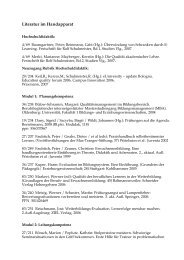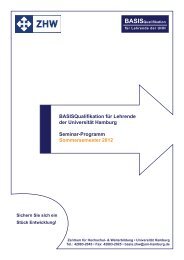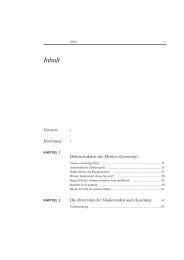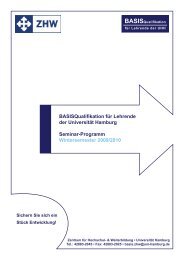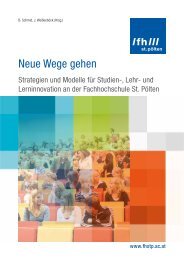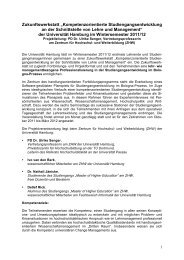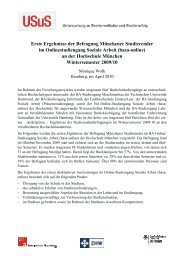“Gibt es eine Net Generation?” (PDF) - ZHW - Universität Hamburg
“Gibt es eine Net Generation?” (PDF) - ZHW - Universität Hamburg
“Gibt es eine Net Generation?” (PDF) - ZHW - Universität Hamburg
Sie wollen auch ein ePaper? Erhöhen Sie die Reichweite Ihrer Titel.
YUMPU macht aus Druck-PDFs automatisch weboptimierte ePaper, die Google liebt.
Schulmeister: Gibt <strong>es</strong> <strong>eine</strong> <strong>Net</strong> <strong>Generation</strong>?<br />
learning proc<strong>es</strong>s<strong>es</strong>, outcom<strong>es</strong>, and ass<strong>es</strong>sment practic<strong>es</strong>.<br />
4. Managing and aligning pedagogical, technical and administrative issu<strong>es</strong> is a nec<strong>es</strong>sary<br />
condition of succ<strong>es</strong>s when using emerging technologi<strong>es</strong> for learning.<br />
5. Innovation with learning technologi<strong>es</strong> typically requir<strong>es</strong> the development of new<br />
learning and teaching and technology-based skills, which is effortful for both students<br />
and staff.<br />
6. The use of emerging technologi<strong>es</strong> for learning and teaching can challenge current<br />
university polici<strong>es</strong> in learning and teaching and IT.«<br />
Einer der kompetent<strong>es</strong>ten Kritiker der Digital Nativ<strong>es</strong>-Th<strong>es</strong>e ist David Buckingham, Prof<strong>es</strong>sor<br />
für Erziehungswissenschaft und Direktor d<strong>es</strong> Centre for the Study of Children,<br />
Youth and Media im Institute of Education der University of London. In <strong>eine</strong>m von ihm<br />
herausgegebenen Sammelband zur Identitätsentwicklung Jugendlicher (Buckingham<br />
2008) äußert er sich unverblümt zu den Th<strong>es</strong>en von Tapscott und Prensky, denen er<br />
»Wishful thinking« und <strong>eine</strong>n »relentl<strong>es</strong>sly optimistic view« vorwirft:<br />
»The technologically determinist stance adopted by th<strong>es</strong>e authors means that there are<br />
many issu<strong>es</strong> and phenomena that they are bound to ignore. They tend to neglect the<br />
fundamental continuiti<strong>es</strong> and interdependenci<strong>es</strong> between new media and ›old‹ media<br />
(such as television)—continuiti<strong>es</strong> that exist at the level of form and content, as well as<br />
in terms of economics. A longer historical view clearly shows that old and new technologi<strong>es</strong><br />
often come to coexist: particularly in the area of media, the advent of a new<br />
technology may change the functions or us<strong>es</strong> of old technologi<strong>es</strong>, but it rarely completely<br />
displac<strong>es</strong> them.« (14)<br />
Tapscott und Prensky übersähen, so Buckingham, die Konvergenzen der Medien, sie<br />
würden die Medienentwicklung als <strong>eine</strong> determinierende Kraft betrachten, die Jugendliche<br />
prägt, auf di<strong>es</strong>e Weise die Interaktion zwischen Individuum und Medien negierend,<br />
<strong>eine</strong> Kritik, die auch von den Reihenherausgebern der MacArthur Foundation, Mizuko<br />
Ito, Cathy Davidson, Henry Jenkins u.a. geteilt wird (ibid, ix). Di<strong>es</strong><strong>es</strong> Argument<br />
führt er in der früheren Publikation »Digital <strong>Generation</strong>s« (Buckingham 2006) noch<br />
deutlicher aus:<br />
»Tapscott‘s approach is clearly based on a form of technological determinism. From<br />
this perspective, technology is seen to emerge from a neutral proc<strong>es</strong>s of scientific r<strong>es</strong>earch<br />
and development, rather than from the interplay of complex social, economic,<br />
and political forc<strong>es</strong>. It is then seen to have effects—to bring about social, psychological,<br />
and political chang<strong>es</strong>—irr<strong>es</strong>pective of the ways in which it is used, and of the social<br />
contexts and proc<strong>es</strong>s<strong>es</strong> into which it enters. Technology is regarded as an autonomous<br />
force that is somehow independent of human society and acts on it from poutside.<br />
This view connects with a familiar rhetoric about the information society (or the<br />
knowledge economy), which similarly appears to attribute a determining power to<br />
some disembodied force (information).« (9)<br />
Sie würden die Jugend in <strong>eine</strong>m romantischen Licht zeichnen und die Digital Divide<br />
leugnen, vor allem aber die Qualität der jugendlichen Betätigung nicht kritisch betrachten:<br />
»this account of the ›digital generation‹ is also bound to ignore what one can<br />
only call the banality of much new media use. Recent studi<strong>es</strong> sugg<strong>es</strong>t that most young<br />
43





